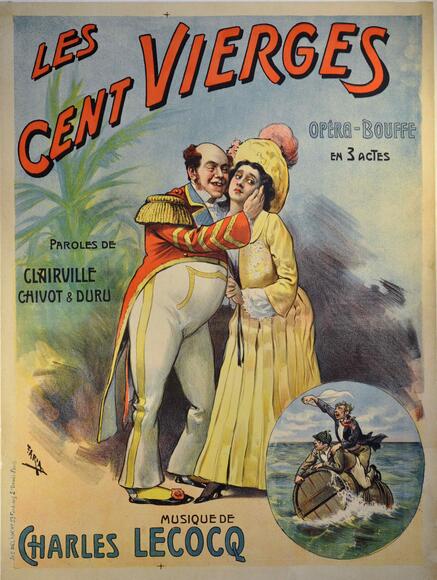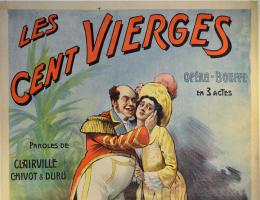Les Cent Vierges

Opérette in 3 acts, first performed on 16 March 1872 at the Théâtre des Fantaisies-Parisiennes in Brussels.
While the war of 1870 raised doubts as to the resumption of musical activities in Paris, Charles Lecocq accepted a commission from Eugène Humbert, director of the Théâtre des Fantaisies-Parisiennes in Brussels. The composer joined forces with the librettists Henri Chivot, Alfred Duru and Jules Clairville, who came up with a truly extravagant libretto. A hundred male settlers, but no women, have been sent to Green Island, a distant British colony. A hundred young women are enlisted to join them. But two married women, Gabrielle (the wife of Duke Anatole de Quillembois) and Églantine Poulardot (the wife of a rich bourgeois) are inadvertently embarked on the ship. Their husbands, disguised as women, set out in pursuit. In the end, after much plotting and many farcical goings-on, everything is sorted out. At its premiere on 16 March 1872, this three-act opérette was a great success. “M. Charles Lecocq’s score is among the most accomplished. Graceful, elegant, well-paced motifs, fine, delicate orchestration: those are the qualities that distinguish this new work by the composer of Fleur-de-Thé”: thus wrote Émile Abraham in Le Petit Journal. Several numbers were particularly applauded: the quintet “Un turbot?” (Act I), the couplets “Sans femme l’homme est un corps sans âme” (Act II) and, above all, Gabrielle’s waltz-song “Je soupire et maudis le destin” (Act II). This piece with its vocalisations and Tyrolean effects has remained popular to this day. In 1872 its success prompted Eugène Humbert to commission a new work from Lecocq: La fille de Madame Angot.

